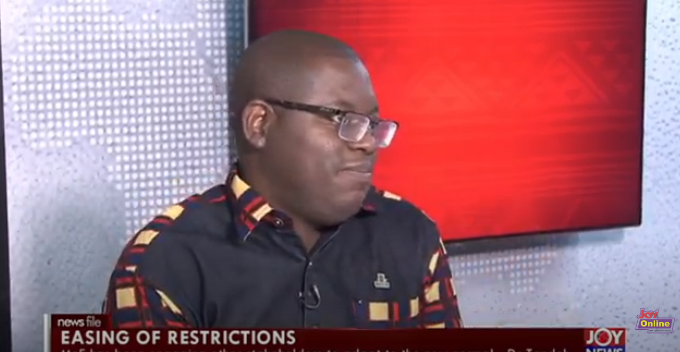The Vice President of IMANI Africa has called on the Ghana Education Service (GES) to publish documents based on which it is reopening schools.
Bright Simmons also wants government to provide data on which the containment of transmission is being executed.
According to him, government has only been paying lip service to the general public concerning the discussion surrounding the reopening of schools but is yet to publish any written document to prove its claims.
This, he told Samson Lardy Anyenini on Newsfile Saturday, defeats the purpose of accountability and transparency in governance and policy making.
“I think the nature of accountability in political office is that you go out of your way to assure people that you’re doing so by providing transparency. So if indeed you’re working on models, publish them.
“Put them out, let the people read them. I have been doing political analysis in this country for 15 years…and I’ve seen governments come and go. And the one thing that the Ghanaian governments refuse to accept is that you need to be pinned down to commitments in writing.
“This thing that we do government by oral culture worries all of us because it becomes very difficult to pin them to specific commitments. If you say you have modules on how you’re going to contain transmissions in school, publish them.”
Bright Simmons stated that per comparative matrixes on how schools are reopening carried out by Brooklyn’s Learning Policy Institute and a number of other organisations, it reveals that Ghana tends to be on the cutting edge.
This he says may not necessarily be a bad thing, “it just shows that we have a bit more appetite for risk and if it’s informed risk that is reasonable.”
His main concern, he told the host is that whereas other countries who are easing restrictions have published extensive and comprehensive information on their models, Ghana has not. And that creates doubt about the effectiveness of Ghana’s school reopening model.
“The challenge that I have is that when I look at these other countries , South Korea, Taiwan, the UK, Denmark, etc, I have done a literature review, I have extensive bodies of evidence about exactly how particular decisions are taken to the exclusion of other decisions.
“So, for instance, the so-called Gold standard which is the alternating streams model has now been fairly validated the most robust though obviously you’d have to collect more data. But the assumption is that given the behaviour of the diseases gestation period etc two weeks alternating tends to be such that if there are symptoms, you’re likely to catch enough of it in the house before they come back in and infect.
“We are doing continuous streaming so there is no alternating. If they go in six weeks it’s six weeks throughout. Well you can have an argument about that, but I would like to see some published work which says that ‘look, we looked at evidence in terms of the disease’s behavior in Ghana and we are quite fine with the continuous stream, we don’t want to do alternating because actually when we look at our situation in Ghana we think that will exacerbate the problem.”
He therefore called on the government and the GES to prove their claims by publishing the analysis and reasoning upon which the school’s reopening was based.
President Akufo-Addo earlier announced the reopening of schools for final year students at all levels of education on Monday, June 15, 2020.
He said after an engagement with the various teacher unions, government has decided to allow final-year students to go back to school to prepare for their final examinations.
In his 10th Address to the nation on measures taken by government to ease restrictions, President Akufo-Addo said all other levels of education will remain closed to students.
However, concerns have been raised by stakeholders about the safety of students who will be returning to school to prepare for their exit exams as well as that of teaching and non-teaching staff.
Deputy Director General of Quality and Access at GES, Dr Tandoh said enough safety protocols are being undertaken to ensure that transmission of the disease is contained and controlled, and the situation does not lead to an explosion of infections.
He said, schools will be provided with hand washing facilities, thermometer guns and an area for isolation will be designated should a student start showing symptoms.
He added that every student will be provided with three reusable face masks as well.
Latest Stories
-
CARE Ghana, Cargill hand over Agro-processing equipment to women producer groups in Ashanti, Central regions
34 seconds -
Woman remanded for allegedly stealing GH¢800k mistakenly transferred to her account
22 minutes -
Not everyone is meant to be a founder – Otabil urges youth to embrace purpose in service
41 minutes -
Doris Boaduwaa bags hattrick in comeback win over Malawi
58 minutes -
Final hours of Day 3 to secure unbeatable deals at Ecobank-JoyNews Habitat Fair
1 hour -
We are committed to a ‘Green Ghana’ – Prudential Bank MD
1 hour -
Nungua Town XI defeats Ghana Internationals in Kplejoo Pre-Festival Match
3 hours -
Osu Castle hosts diplomatic showcase of wellness as Ghana, India unites for International Day of Yoga
3 hours -
U.S. and Israeli Strikes on Iran: A Racist, Colonialist Assault on Sovereignty
4 hours -
Prof Gyampo clarifies interaction with Special Prosecutor over raid on SMS offices
4 hours -
Prof Gyampo called and texted OSP during raid on SML – OSP claims
4 hours -
Nigeria sprinter Favour Ofili switches allegiance to Turkey
4 hours -
Ahwoi and Bartels-Kodwo families open residence to mourners following passing of Ama Adoma Bartels-Kodwo
4 hours -
Mpox Outbreak: Western Regional Health Directorate springs into action
5 hours -
OSP rebuts Gyampo’s ‘vendetta’ allegation over investigation into Ofori-Atta
6 hours

